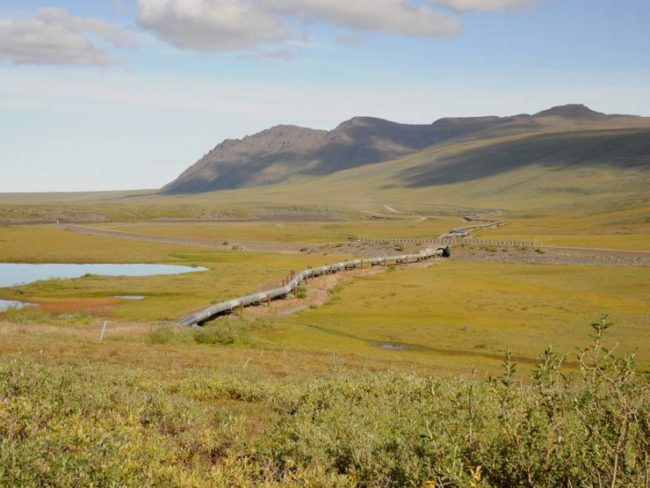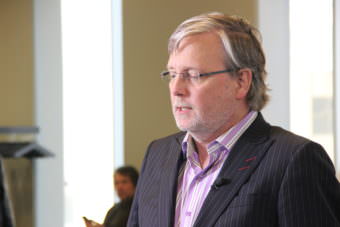
Amid a wave of new oil discoveries in Alaska, other companies are hoping to get lucky, too. And in pursuit of the next billion-barrel find, two companies from Texas and Australia are trying something a little different.
After the State of Alaska’s oil and gas lease sale in December, Burgundy Xploration CEO Paul Basinski offered this explanation for the name of his big North Slope project.
“Everything we do is about wine,” Basinski said. “That’s why it’s called Icewine. Because it’s cold up here, and I like German ice wine”

At the lease sale, held in Anchorage, Texas-based Burgundy and its Australian partner, 88 Energy, picked up hundreds of thousands more acres on the North Slope to pursue Project Icewine. Basinski was thrilled with the results.
“We’ve now tied up what we believe to be very much of a world class shale play,” Basinski said.
That’s what Project Icewine is all about — finding a world-class shale play in the Arctic.
Unlike conventional oil discoveries like Prudhoe Bay, shale oil is harder to recover, requiring technology like hydraulic fracturing to get it out of the ground. But improvements to horizontal drilling and fracking techniques led to the recent oil and gas boom in the lower 48. Now, Basinski hopes to bring the shale revolution to Alaska.
“We believe that this is the future of the Arctic,” Basinski said.
According to the Alaska Department of Natural Resources, only one other company holds leases to pursue shale oil on the North Slope, Great Bear Petroleum. That company has been working to develop their leases since 2010, but hasn’t drilled there for several years, the state reports.
But this week, 88 Energy announced they’ve started setting up a rig on the North Slope to drill a second well for Project Icewine. According to a recent 88 Energy presentation, the company thinks its leases may hold between 1.4 and 3.6 billion barrels of oil.
In an interview with financial news outlet Proactive Investors last month, 88 Energy Managing Director Dave Wall said the well will help them figure out if there’s enough accessible oil to make the project commercially viable.
“It is crunch time. Icewine 2 is a well that’s designed to do a production test of our main play in our Alaskan asset,” Wall said. “Really, this is the key event in terms of unlocking the value of this play.”
88 Energy hopes to begin flow testing the well by June or July. Shortly after, the companies may know if they’re sitting on the Arctic oil shale play of their dreams.
But proving the oil is there is just the first step. Former Alaska Department of Natural Resources Commissioner Mark Myers explained there’s a big reason the shale oil boom hasn’t hit the North Slope already: cost.
Myers said fracked wells “produce at high rates initially but then decline very rapidly, which means you have to go back in and drill more wells.”
“Shale development requires a much higher density of well bores than most conventional drilling. And that’s more money, more pads, more roads and infrastructure,” Myers said.
This becomes a big issue on the environmentally sensitive North Slope, Myers said, where companies must make costly investments on infrastructure like like ice roads to protect the tundra.
Another challenge is that fracking requires lots of water and a way to dispose of that water once its been used. Neither would be easy or cheap where Project Icewine is located.
Although its main target is shale oil, 88 Energy has hinted it’s possible they’ll find conventional oil in Project Icewine territory, too.
Myers said if the companies can get at the easier-to-recover oil, their unconventional pursuit is more likely to pencil out.
Elizabeth Harball is a reporter with Alaska's Energy Desk, covering Alaska’s oil and gas industry and environmental policy. She is a contributor to the Energy Desk’s Midnight Oil podcast series. Before moving to Alaska in 2016, Harball worked at E&E News in Washington, D.C., where she covered federal and state climate change policy. Originally from Kalispell, Montana, Harball is a graduate of Columbia University Graduate School of Journalism.




